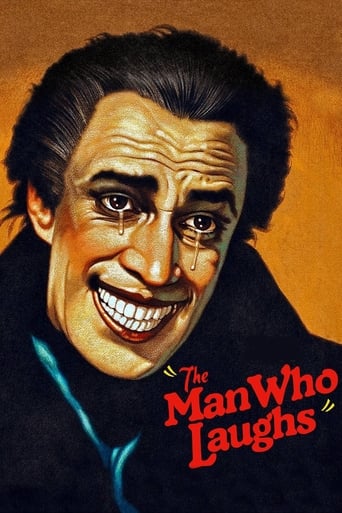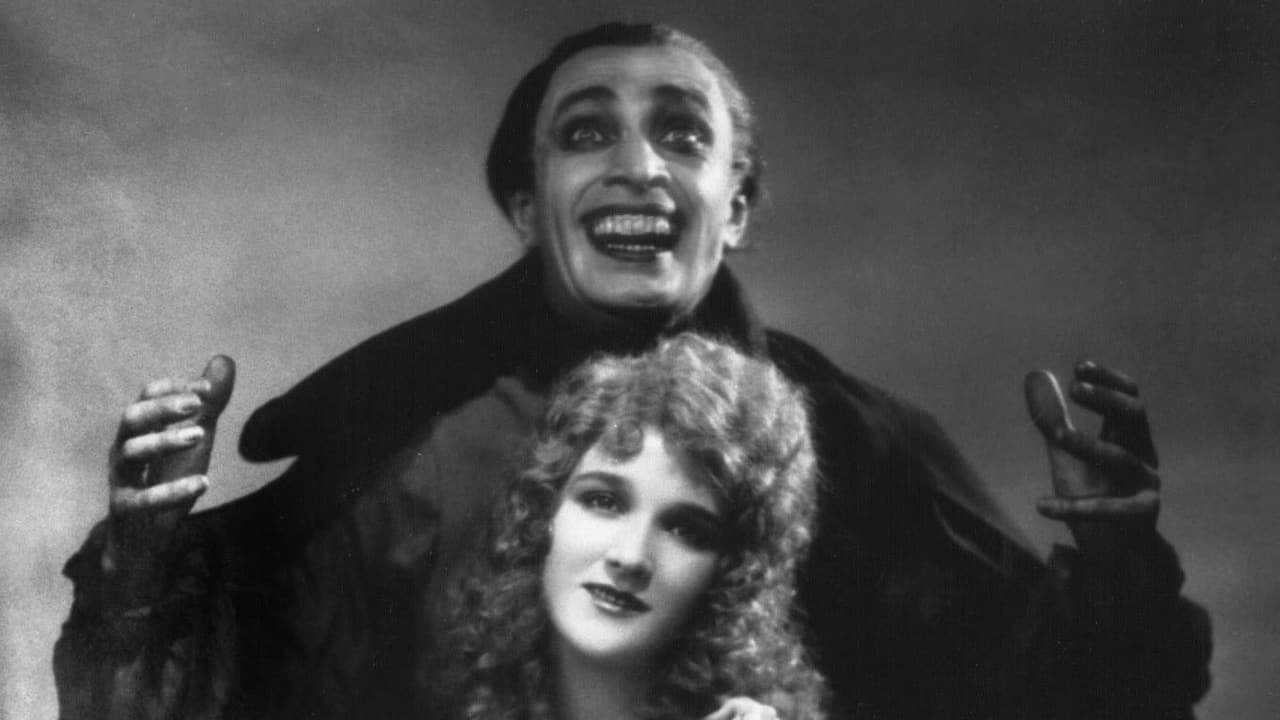Coventry
Practically ALL horror movies from the silent era are brilliant masterpieces, but obviously you have to be in a certain type of mood in order to truly appreciate them. You can't just pop a silent horror into the DVD-player after a busy and stressful day, as these are films that you literally have to absorb with all your senses. Whether it's a German expressionist classic ("Nosferatu, eine Symphonie des Grauens", "Das Cabinet des Dr. Caligari"
) or one of the earliest Universal classics ("The Phantom of the Opera", "The Hunchback of Notre Dame"
), silent horror movies are sophisticated and emotionally exhausting, but oh so worthwhile! "The Man Who Laughs" is a Universal production, albeit with the collaboration of German expressionist talent. The famous production company hired the visionary director Paul Leni ("Waxworks") and charismatic protagonist Conrad Veidt ("The Hands of Orlac") in order to peer with the previous success films, but unfortunately the invention of sound in films and the very first movies with audible dialogs were in 1928 the main reasons why "The Man who Laughs" sadly never received the fame and recognition it fully deserved. Almost 90 years later now, the film luckily does get considered as an immortal classic. "The Man who Laughs" is a brilliant movie, but not exactly from start to finish. I have to say, the first 15-20 minutes are downright mesmerizing and most definitely belong in my personal list of greatest movie-moments in history. I could probably write five full pages about the magical first quarter, so unbelievably fantastic it is! The opening sequences are simultaneously endearing, shocking, horrifying and tragic. James II, King of England in the year 1690, and his diabolical jester Barkilphedro capture nemesis Lord Clancharlie and condemn him to death in the iron maiden. Right before dying, Lord Clancharlie also finds out that his young son Gwynplaine got sold to the cruel Comprachico gypsies. They surgically carve a permanent grin in the faces of their victims to sell them as clowns or jesters. Later, when the Comprachicos are exiled from England, they abandon the poor and reluctantly smiling boy in the cold England. He rescues a baby girl from the arms of her dead mother and finds shelter under the wings of the wise philosopher Ursus. This description only covers the first fifteen minutes of the film, but – as stated clear already – they are stupendous! The visually striking first scene inside the flamboyant bedroom of King James, Gwynplaine's heartbreaking journey through the snow and underneath dangling corpses on the gallows and, most of all, the perplexing moment when the young boy saves the blind baby Dea that would later become his muse. The footage where the Gwynplaine's savior Ursus screams: "Stop laughing! Stop laughing, I said!" and the poor lad replies with "I'm not laughing" truly brought tears to my eyes. Most unfortunately, however, the remaining hour and a half aren't nearly as brilliant, captivating and emotional as the first fifteen. Gwynplaine and Dea grow up but remain with Urses and they make a living as traveling circus artists. Gwynplaine becomes famous across the nation as "the laughing man". He gets recognized as the lost son of Lord Clancharlie and becomes noticed by the eccentric Duchess Josiana. Far too much time is spent on the forced romance/game of seduction between Gwynplaine and Josiana, illustrated through a couple of scenes that were very erotic and ahead of their time, even though it's abundantly clear that his craving to be with his beloved Dea will overrule everything. The film too often gets a little bit tedious and repetitive, but plenty of things remain worth seeing, like the continuously stellar acting performances from the ensemble cast, too many to mention visual highlights captured by Paul Leni's gifted art-director's eye and a genuinely uncanny atmosphere every time that diabolical jester Barkilphedro in on screen. All footage with the sensual actress Olga Baclanova (later the anti-heroine in "Freaks") literally burst with eroticism, whereas actress Mary Philbin embodies the pure and wide-eyed innocence. Conrad Veidt
Hitchcoc
One of the things I noticed in viewing this was the tight editing. There is little wasted space. Many of the silent films are presented in jerky photographic moments, with the actors emoting and letting us figure out their motivations. This one begins with a sad event. A revolutionary pays the price of his life for not respecting James II. In addition to his execution, his little son is surgically altered to have a perpetual smile, to become the subject of ridicule, seeming to be laughing. The little boy is cast aside by the Gypsies that did this to him and on his journey finds a dead mother clutching a little baby girl. He seeks refuge in the home of a poet and this launches him on a career as a kind of freak actor. The little girl grows to be a beautiful woman, but she is blind. He feels great love for her, but is afraid that other women either hate him or pity him. He becomes a great celebrity, but is submerged in loneliness and depression, having to go in front of audiences each day to be a clown. Mixed into all this is the fact that he is heir to a great position and becomes a threat to the aristocracy and to the Queen. How this is all sorted out is utterly captivating. There is a little Les Miserables and a little Elephant Man in his portrayal. A truly remarkable film.
Johan Louwet
Whenever there is someone needed to play the role of a mutilated or disfigured man I automatically think of the man of a 1000 faces Lon Chaney. But this time the title role is played by the German actor Conrad Veidt. I have seen Veidt in other great roles as Cesare in The Cabinet of Dr. Caligari and as Orlac in Orlac's Hands. That he would pull of a convincing Gwynplaine was in no doubt. He didn't disappoint and neither did Mary Philbin as the blind Dea. I already loved her in The Phantom of the Opera. She really is fitting for the role as fragile girl. But most kudos to Veidt, it must have been hard to have your face in a constant grin. Despite this permanent smile it was still possible to read Gwynplaine's real feelings, even when sad. I think only great silent stars as Veidt or Chaney could have pulled this of. That's why I love silent movies as the focus is so much on expression. The movie is filled with some exciting scenes just like the silent version of the Hunchback of Notre Dame with what seems a faithful setting of the England of the 17th century. The costumes seem to fit the time period. The story is gripping, tension until the very end even if it's a sentimental sweet ending I thought it was great. I also need to applaud Olga Baclanova for playing the licentious duchess and the dog who played Homo. I really loved the scene when Homo tries to lead Dea to her beloved Gwynplaine. And not to forget Brandon Hurst as Barkilphedro, wow he really has the face for playing such a mean character.
kidboots
When Universal found that they had two monumental successes on their hands with "The Hunchback of Notre Dame" and "The Phantom of the Opera", both of whom had for their main characters a being so deformed and hideous, they turned once again to Victor Hugo for what they hoped would be another hit. But Lon Chaney was not available - he had gone to MGM in the meantime and was now established as their top star and they were not about to lend him. The late 1920s saw German expressionism at it's height in Hollywood and the studios at the forefront of the surge were Fox and Universal. So Universal turned to the country of it's founder's birth and in particular a thriller called "Waxworks" to find both a new director, Paul Leni, and a star, Conrad Veidt.The very grim Victor Hugo story is about an outlaw band - the dreaded Comprachicos, whose surgeon roves the country carving huge grotesque grins onto young children's faces, forcing them to grow up to become side show freaks. There are some chilling images in the prologue where Gwynplaine, as a child, wanders among bodies and human bones hanging from scaffolds as a blizzard whips up. The little boy then finds the blind Dea clasped in her dead mother's arms. The England that Paul Leni has conjured up is a bleak and haunted world.As the years go on Gwynplaine (Veidt) becomes the "laughing man", a strolling player in the troupe of Father Ursus (Cesare Gravina), the one person who didn't turn his back on the orphans, but to Dea (beautiful Mary Philbin), who cannot see his hideous grin, he will always be goodness and light. Chaney could not have bettered Veidt's performance in which his eyes are truly the windows to his soul. At Southwark Fair, one of the sideshow proprietors (George Siegman, a Griffith regular) realises that Gwynplaine is the missing heir to Lord Clancharlie's estates, now taken over by the seductive Duchess Josiana and the ambitious Barkiphedro who had Gwynplaine's father tortured and killed in the "Iron Lady" over 20 years before. Olga Baclanova is just a sensation - the censor must have been asleep - she has two nude scenes within her first introduction and she plays a Countess who loves nothing better than donning dirty peasant rags and mingling (and allowing them to take great liberties) with the ruffians down at the fair.The last part of the film is very Griffith influenced ("Orphans of the Storm"). Gwynplaine's castle and land have rightfully been restored to him but he is being forced into marriage with the lustful Josiana. Dea (like the blind Louisa in "Orphans") is thwarted at every turn until she and Ursus are forced from the city by the power hungry Barkiphedro, then it is Gwynplaine's turn to race through the town. His head was turned by Josiana and in the scene where she strips away his mask and, displaying both lust and loathing, kisses his deformed mouth, there is so much sensuality and passion in her performance, a reviewer at the time commented that "she burns holes in the screen".The Kino release that I have features a restored orchestral Movietone soundtrack, complete with a theme song "When Love Comes Stealing" that they may have hoped would be as popular as "7th Heaven's" "Diane" - but it wasn't.


 AD
AD



